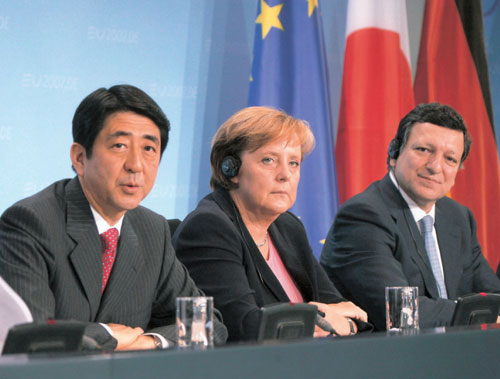Summary > CHAPTER 2 Regional Diplomacy > 4. Europe
Sharing fundamental values such as democracy, human rights, and the rule of law, Japan and Europe are strategic partners with a leading role in fostering the stability and prosperity of international society. It remains important for Japan to advance cooperation and collaboration while further strengthening bilateral relationships with the countries of Europe, notably the United Kingdom and France, which are permanent members of the UN Security Council as well as member countries of the G8, and Germany and Italy, which are members of the G8. Moreover, in fulfilling the leading role in the international community, it is now more important than ever that Japan promote political dialogues and cooperation with the European Union (EU) and the North Atlantic Treaty Organization (NATO): The EU continues to increase its presence on the world stage in terms of political, security and economic matters. And the North Atlantic Treaty Organization (NATO) has played an indispensable role in promoting the peace and stability in places beyond the border of the Euro-Atlantic region since the end of the Cold War. Furthermore, Japan has been enhancing its dialogues and cooperation with the countries of Central and Eastern Europe and the Baltic states, grounded in its good relations with these countries in order to support their efforts to achieve political stability and economic prosperity. It is of a growing significance for Japan and the countries of Europe to advance the close relationships on a broad range of aspects and to work together for promoting political, economic, and cultural exchanges.
In January, Prime Minister Abe visited the United Kingdom, Germany, Belgium, and France, holding meetings with the heads of state and the president of the European Commission. He also paid the first ever visit by a Japanese Prime Minister to NATO Headquarters. In the meantime, Foreign Minister Aso visited Romania, Bulgaria, Hungary, and Slovakia, having meetings with the heads of state and foreign ministers of those countries in January.
Further impetus was given to the reinforcement of relations with Europe in May, when Foreign Minister Aso attended the Japan-EU Troika Foreign Ministers' Meeting, the V4 plus Japan Foreign Ministers Meeting, and the Foreign Ministers' Meeting of ASEM, after which he visited Spain. In June, Prime Minister Abe visited Germany to participate in the G8 Summit 2007 Heiligendamm. At the Summit, he talked with the heads of state of the G8 member countries and the President of the European Commission, reaffirming their cooperation in the area of climate change and other important fields. Japan also strengthened its dialogue with the regional cooperation organization comprised of Georgia, Ukraine, Azerbaijan, and Moldova (GUAM) by means of holding a foreign ministerial-level meeting with them in June.
Many European dignitaries also visited Japan in 2007, including Prime Minister Romano Prodi of Italy (April), Chancellor Angela Merkel of Germany (August), and NATO Secretary General Jaap de Hoop Scheffer (December). These meetings with various European countries and institutions throughout 2007 sent a clear message that both Japan and Europe are intent on mutually reinforcing their cooperative relationship.

Prime Minister Abe (left) with Federal Chancellor of Germany Merkel (middle) and President of the European Commission Barroso (right) at the joint press conference of the 16th Japan-EU Summit
(June 5, Berlin, Germany; photo: Cabinet Public Relations Office, Cabinet Secretariat) |
Text File
PAGE TOP 

